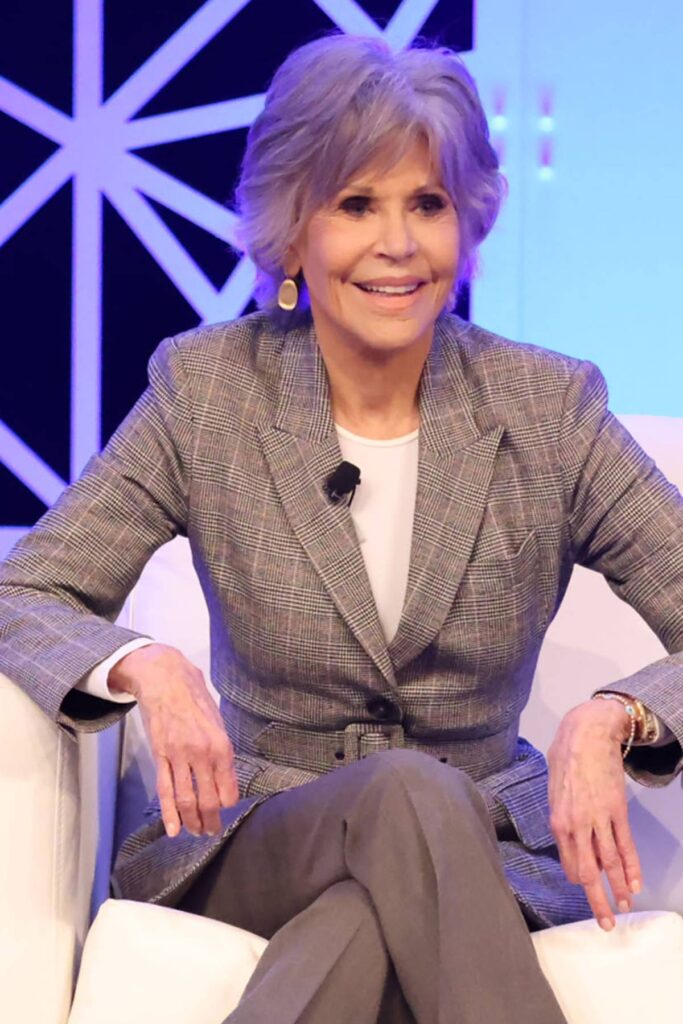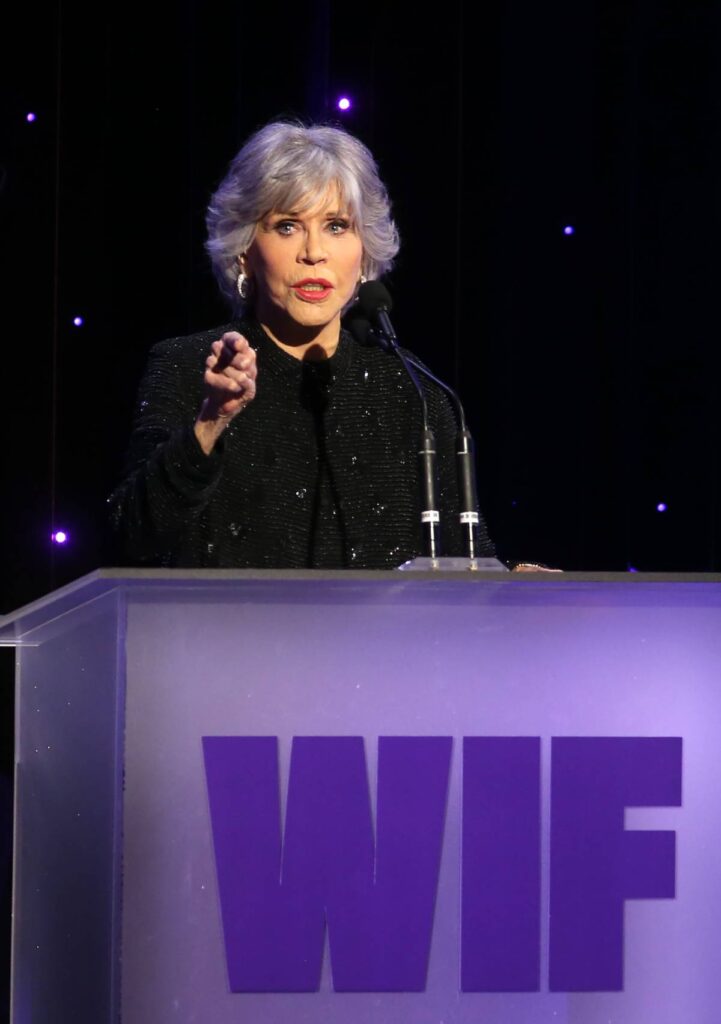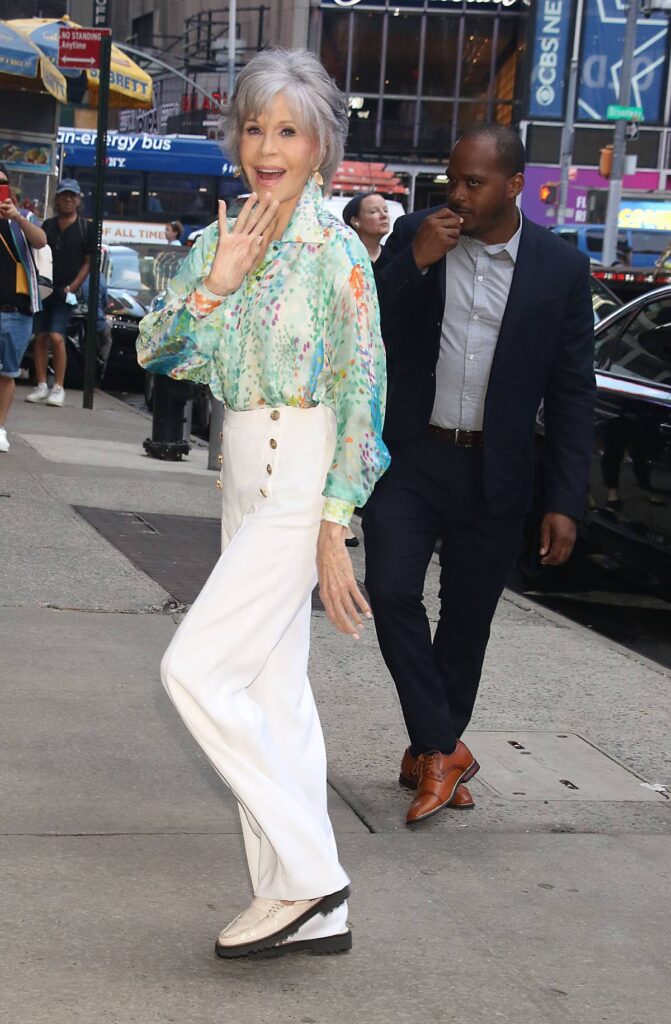Last December, Jane Fonda announced her non-Hodgkin’s lymphoma is in remission thanks to chemotherapy. This is, obviously, fantastic news. But Jane’s a fighter, we know that. What I didn’t know, is there was a point in Jane’s life she didn’t expect to live past the age of 30. Jane battled the eating disorder bulimia in her 20s that stemmed, according to Jane, from being in a deeply unhappy place in her life. As her addiction grew, she realized how much it was impacting her health. At one point, she didn’t think she would survive past her 20s. But she did, with her bulimia becoming more and more of a burden on her, until she realized it really might kill her. Because no one was talking about it back then, Jane had no support or anyone to go to when she wanted to quit. So she quit cold turkey.
Jane Fonda feels lucky to be alive.
During an appearance on Call Her Daddy Wednesday, the film icon says she struggled with an eating disorder in her twenties.
Just as her career was beginning, she said, she began suffering from bulimia.
“I led a secret life. I was very, very unhappy. I assumed I wouldn’t live past 30,” Fonda said, joking that she doesn’t “understand” how she’s now 85.
She detailed the “secret life” she led that consisted of not going out, not dating, and being “unhappy” overall. “And then I was also making movies that I didn’t very much like,” she said, referring to the romantic comedies she starred in at the start of her career, like Tall Story (1960) and Sunday in New York (1963).
“It seems so innocent in the beginning,” Fonda said of her experience with the eating disorder. “What you don’t realize is, it becomes a terrible addiction that takes over your life.”
The 80 for Brady star said that it harmed her appearance, making her look tired, and also impeded her ability to have an “authentic relationship.”
“Your day becomes organized around getting food and then eating it, which requires that you’re by yourself and that no one knows what you’re doing. It’s a very lonely thing. And you’re addicted. If you put any food in you, you want to get rid of it.”
While it began in her twenties, she told host Alex Cooper, it lasted for two decades. She got to a point in her forties, she said, where she thought, “‘If I keep on like this, I’m gonna die.'”
Despite being married — at the time, to political activist Tom Hayden — and being a mother, she wasn’t sure she would survive. “My life was important,” she said. “But I was becoming less and less able to continue it.”
“I didn’t realize that there were groups that you could join — I didn’t know anything about that yet. And nobody talked about it. I didn’t even know there was a word for it. And so I just went cold turkey, and it was really hard.”
I think eating disorders and disordered eating are discussed more frequently now. But in case it isn’t discussed in your circles, what Jane said is true: it’s a terrible addiction and it absolutely takes over your life. And like any addiction, it’s always hovering right there in the shadows. Also like any other addiction, it can blow up before you know what’s happened. Like Jane said, it starts off simply and seems manageable. It. Is. Not. I like that Jane brought up the isolation of bulimia because the health part is usually hammered home. And it should be, it destroys your stomach lining, your esophagus, weakens your heart and lungs, messes up your colon and destroys your teeth enamel, but it is also a very lonely disease. Because the only people who will have anything to do with you are other bulimics. Which is great if you find bulimics who have quit or are actively trying to. If not, fellow bulimics trade tips and it gets competitive and it’s scary.
This puts Jane’s 80s aerobics empire in a new light. If she went cold turkey on bulimia, which must have been so hard to do, she probably needed something to replace it. She found a way to move away from the body image issues that give way to bulimia with exercise. She also gave herself something else to focus on and control with this new exercise world she was building. Given that context, it must be gratifying to know that she helped so many women with their own struggles with those tapes. Thank goodness Jane survived. It’s good she’s bringing this up. It’s a hard subject. Not all us know how to talk about it yet.
Photo credit: Cover Images















My best friend’s mom still uses her jane fonda workout tapes. Going into her house is like going back in time
Haha, that’s awesome.
Jane was a pioneer as a fitness guru, media mogul and lifestyle brand maker. Her tapes were all time best sellers and her fitness empire was groundbreaking.
And I didn’t realize she was 45 when she did it. I can imagine that she really did divert her energy into positive control of her body after breaking from her disorder.
Never thought I would be a fan of Jane Fonda, but I’ve been watching episodes of “Grace and Frankie” on Netflix and I absolutely love her. She;s friggen great.
Her scenes on Newsroom were masterclasses in acting; Sam Waterston and Jeff Daniels seemed in awe of her and a scene where she and Marcia Gay Harden get stoned at a funeral is brilliant. She’s a great actress.
@Lightpurple says::
Thank you. Might you know where I could watch episodes of Newsroom? Never heard of it before today. 🙂
@shanaynay, it’s on HBO/HBOMax. Also features Dev Patel, Allison Pill, and a bunch of others.
At one point in my life, one of my best friends was a recovering bulimic and the other was a recovering anorexic – and I never understood the competitive aspect until they started comparing notes of who had been more unhealthy at the worst of their illnesses. Because I had never had an eating disorder, I didn’t fully grasp the mental health aspect until then.
I like Jane – she’s chased down some demons in her life and she seems to have found a place of wisdom.
My ED didn’t last nearly as long as hers, but I too kept it secret and eventually went cold turkey when I realised the damage I was doing to myself, and specifically to my fertility because I knew I wanted to have kids some day (irony of ironies – turns out I was infertile anyway, but that’s a whole other story!). All this to say – I applaud her for talking about it. We should all talk about it more. It’s so depressingly common.
I’ve been both anorexic & bulimic, and you’re right we should talk about it more. I understand both issues better now that I’m decades past both, but I didn’t at the time. It’s tough to discuss, though, because when you’re deep in the disorder you can hear someone talk about the crazy way they ate/purged/didn’t eat & how they realized that might kill them, but all you’re thinking is huh, haven’t tried that–I can do that & stay thin & look that good? It’s tough. I can see now professional help would have been the best route for me (as it is for most, I would guess), but at that time it wasn’t discussed nor would I have known how to get help. I only figured this stuff out later.
Jane Fonda is an incredibly strong person
I just absolutely love her, she is an inspiration!
I wish more people understood the life-ruining power of eating disorders. I look back at my teens and twenties, and I wonder what my life could have been like if all my thoughts weren’t consumed with bulimia. It’s hard to describe how when you are in the grips of an ED, nothing else matters except counting calories, plotting weight loss goals, and that affirming (or destroying) moment when you step on the scale. I went to an Ivy League university and all my text books have columns and columns of numbers in every margin… I wasn’t a math major. I guess I really was a clever girl that despite all that I still managed to seem “together” on the outside (even though I couldn’t sustain a relationship and had trouble holding down jobs). It wasn’t until, broken, I decided that a lower number on the scale wasn’t worth it (and found a fantastic therapist, psychiatrist, and doctor– and also came clean to my family about what I was going through) that I entered recovery. But recovery is very possible, and it’s beautiful on the other side.
Completely agree. I wouldn’t wish an eating disorder on anyone. I lost many years being consumed (no pun intended) by anorexia & bulimia. The “voice” was the hardest thing for me to shake & very difficult to explain to mental health practitioners. I had to unlearn the counting as well.
Congrats on your recovery. It is so much better without the ED, but I know it isn’t easy.
Agreed, although, as wild as it sounds, I wouldn’t change a thing about my past.
Same. All that time, all that wasted thought & worry & self-consciousness, and for what? Feeling tired & cold all the time?
I’m amazed by how many people I know IRL who have talked about this “I never thought I’d live to be 30 or 40”.
For very different reasons, at some point in their younger years they truly felt they were “one day at a time”.
I find JF interesting. As she is aging she is openly discussing her life, difficulties, success.
Jane’s been though some things. And she’s come out on the other side poised and with wisdom and I love that for her.
I had the same fear when I was 22. Didn’t think I’d live to see my 23rd birthday. I’m turning 35 in a few months.